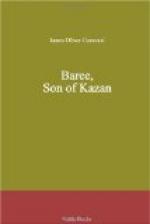He tossed the flesh to Baree. There was no equivocation in the manner of its acceptance. Baree was famished—and the meat was flung to him by a friend. He buried his teeth in it. His jaws crunched it. New fire leapt into his blood as he feasted, but not for an instant did his reddened eyes leave the other’s face. Carvel replaced his pack. He rose to his feet, took up his rifle, slipped on his snowshoes, and fronted the north.
“Come on. Boy,” he said. “We’ve got to travel.”
It was a matter-of-fact invitation, as though the two had been traveling companions for a long time. It was, perhaps, not only an invitation but partly a command. It puzzled Baree. For a full half-minute he stood motionless in his tracks gazing at Carvel as he strode into the north. A sudden convulsive twitching shot through Baree. He swung his head toward Lac Bain; he looked again at Carvel, and a whine that was scarcely more than a breath came out of his throat. The man was just about to disappear into the thick spruce. He paused, and looked back.
“Coming, Boy?”
Even at that distance Baree could see him grinning affably. He saw the outstretched hand, and the voice stirred new sensations in him. It was not like Pierrot’s voice. He had never loved Pierrot. Neither was it soft and sweet like the Willow’s. He had known only a few men, and all of them he had regarded with distrust. But this was a voice that disarmed him. It was lureful in its appeal. He wanted to answer it. He was filled with a desire, all at once, to follow close at the heels of this stranger. For the first time in his life a craving for the friendship of man possessed him. He did not move until Jim Carvel entered the spruce. Then he followed.
That night they were camped in a dense growth of cedars and balsams ten miles north of Bush McTaggart’s trap line. For two hours it had snowed, and their trail was covered. It was still snowing, but not a flake of the white deluge sifted down through the thick canopy of boughs. Carvel had put up his small silk tent, and had built a fire. Their supper was over, and Baree lay on his belly facing the outlaw, almost within reach of his hand. With his back to a tree Carvel was smoking luxuriously. He had thrown off his cap and his coat, and in the warm fireglow he looked almost boyishly young. But even in that glow his jaws lost none of their squareness, nor his eyes their clear alertness.
“Seems good to have someone to talk to,” he was saying to Baree. “Someone who can understand, an’ keep his mouth shut. Did you ever want to howl, an’ didn’t dare? Well, that’s me. Sometimes I’ve been on the point of bustin’ because I wanted to talk to someone, an’ couldn’t.”
He rubbed his hands together, and held them out toward the fire. Baree watched his movements and listened intently to every sound that escaped his lips. His eyes had in them now a dumb sort of worship, a look that warmed Carvel’s heart and did away with the vast loneliness and emptiness of the night. Baree had dragged himself nearer to the man’s feet, and suddenly Carvel leaned over and patted his head.




